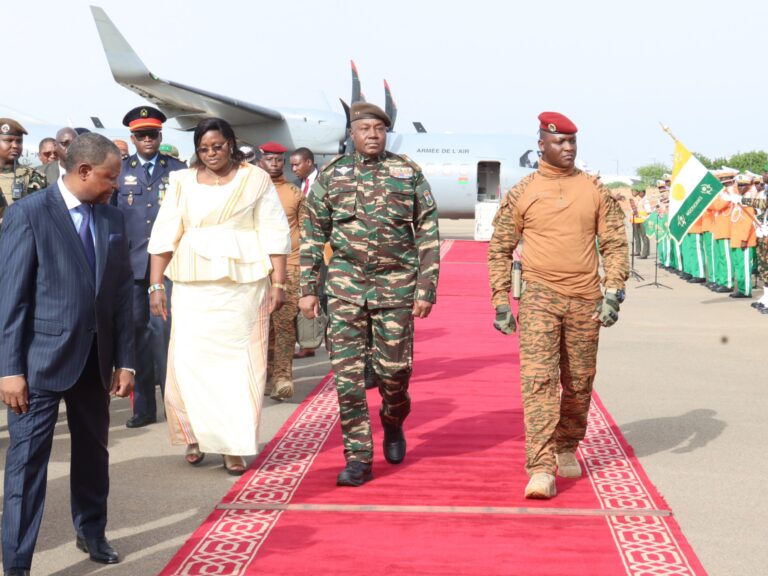Military leaders from Burkina Faso, Mali and Niger hailed the newly signed treaty as a step “toward greater integration” between the three countries, the latest demonstration of their distancing from traditional regional and Western allies.
At a summit in the Nigerien capital of Niamey on Saturday, the three leaders signed a confederation treaty that aims to strengthen a mutual defense pact announced last year, the creation of the Alliance of Sahel States (AES).
The signing capped the first joint summit of the leaders – Nigerien General Abdourahmane Tchiani, Burkinabe Captain Ibrahim Traore and Malian Colonel Assimi Goita – since they came to power following successive coups in their West African neighbours.
This also came just months after the three countries took of of the regional bloc the Economic Community of West African States (ECOWAS) in January.
Speaking at Saturday’s summit, Tchiani called the 50-year-old ECOWAS “a threat to our states.”
The West African economic bloc had suspended the three countries after their respective military coups, which occurred in July 2023 in Niger, in September 2022 in Burkina Faso and in August 2021 in Mali.
ECOWAS also imposed sanctions on Niger and Mali, but the bloc’s leaders remained hopeful that the trio would eventually return.
“We are going to create an ESA of the people, instead of an ECOWAS whose directives and instructions are dictated by powers foreign to Africa,” Tchiani declared.
The Burkinabe president also accused foreign powers of seeking to exploit the three countries. The three countries regularly accuse France, a former colonial power, of interfering in ECOWAS affairs.
“The West considers that we belong to them and that our wealth also belongs to them. They think that it is up to them to continue to tell us what is good for our states,” he said.
“That time is gone forever. Our resources will remain for us and for our people.”
For his part, Malian President Goita said that the strengthening of relations means that “an attack on one of us will be an attack on all the other members.”
Changing influence
In a report from Abuja on Saturday, Al Jazeera’s Ahmed Idris noted that the three military leaders met just a day before the scheduled ECOWAS meeting in the Nigerian capital.
Efforts to facilitate the return of countries to the bloc should be discussed, Idris said.
“Many people think that the meeting in Niger was intended to counter everything that came from ECOWAS and also to clarify their position: they will not return to the Economic Community of West African States,” he explained.
Idris added that the newly elected president of Senegal, Bassirou Diomaye Fayerecently visited the three countries informally in a bid to restore ties.
“However, it is not certain whether he received a positive response or not,” he said.
Adama Gaye, a political commentator and former ECOWAS communications director, said the creation of the three-member Sahel States Alliance has “weakened” the economic bloc.
However, Gaye told Al Jazeera that “despite its real notoriety, ECOWAS has not performed well in regional integration, promoting intra-African trade in West Africa and also ensuring security” in the region.
“This therefore justifies the feeling of many in West Africa – ordinary citizens and even intellectuals – who are questioning the status of ECOWAS, wondering whether it needs to be revised, reinvented,” he said, urging the bloc to engage in diplomacy to try to bridge the gap.
Violence and instability
The Niamey summit also took place a day before the United States meets in New York. complete its withdrawal from a key base in Niger, highlighting how new military leaders have reshaped the security relationships that have defined the region in recent years.
Armed groups linked to al-Qaeda and ISIS are competing for control of territory in the three countries, triggering waves of violence and raising concerns in Western capitals.
But after recent coups, these countries’ ties with Western governments have deteriorated.
French troops completed their withdrawal from Mali in 2022 and they left Niger and Burkina Faso last year.
Meanwhile, U.S. Air Force Maj. Gen. Kenneth Ekman said earlier this week that about 1,000 troops would complete their withdrawal from Niger’s Air Base 101 by Sunday.
The United States is also leaving a separate $100 million drone base near Agadez in central Niger, which officials have described as critical to gathering intelligence on armed groups in the region.
While ousting their former Western allies, the military leaders of Burkina Faso, Niger and Mali have increasingly sought after security and economic ties with Russia.
It remains unclear, however, whether the new approach has helped stem the violence in these countries, which are home to around 72 million people.
In 2023, Burkina Faso saw a massive escalation of violence, with more than 8,000 people killed, according to the Armed Conflict Location and Event Data Project (ACLED) tracker.
In Niger, slight gains against armed groups have largely been reversed after the coup, according to ACLED.
Meanwhile, an offensive by Malian forces and Wagner mercenaries saw “elements” of the Russian government-linked group “involved in the indiscriminate killing of hundreds of civilians, destruction of infrastructure and looting of property, as well as triggering mass displacement,” ACLED said.
Around three million people have been displaced by the fighting across the countries.


